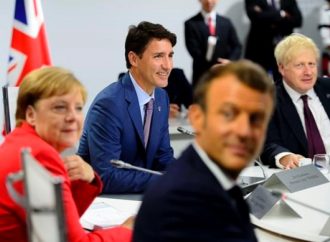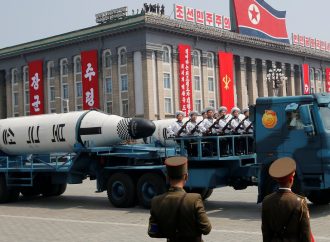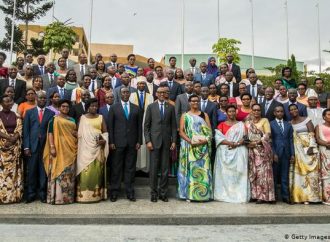By Althea-Maria Rivas and Gabrielle Bardall
The Canadian government’s review of the International Development Assistance policy and funding framework is noteworthy in its ambition to promote feminism by applying “a feminist lens … to all of Canada’s international assistance activities.” Committed feminists in our respective fields of international relations and comparative democratization, we were encouraged by this declaration and support its intentions. But what is a “feminist lens” and how can we apply it to our development policies, particularly in the area of political participation?
Uncritically equating any program that deals with women and girls with feminism is a common pitfall in international development. Surprisingly few aid policies or programs seek to look much deeper. Instead, meaningful feminist policy in international programs implies support for more equitable gender relationships by challenging patriarchal institutions and customs, promoting state accountability, and countering economic and social marginalization. The development review is on the right track with its stated ambition to promote empowerment, focus on rights, and advance equality, but will it actually be able to leap over the rhetoric to focus on substantive contributions, challenges, and experiences? In this two-part blog, we define what it means to integrate a meaningful feminist approach into Canada’s global support for inclusive political life and institutions (Part 1) and offer policy suggestions on how to reach the feminist goals of empowerment, rights, and equality (Part 2).
The hope and the challenge
The modest growth in past decades in women’s political representation and public leadership roles is the fruit of hard work in the face of complex barriers and profound inequity. From 1995 to 2016, the number of women in national parliaments grew by only 11.3%, bringing the world average to 22.8%. Discriminatory gender norms remain entrenched, despite the growing presence of women in public life. The success of quotas and other legal reforms in increasing the number of seats held by female parliamentarians does not reflect a corresponding increase in influence or empowerment. Neither do these quantitative achievements reflect a consensus-based change of the cultural attitudes underlying inequality. In other words, fundamental barriers to empowerment may remain unaltered even when legal reforms generate modest gains. These barriers include the gendered dynamics of political institutions, stereotypes of politics as a “masculine sphere” or of women’s inferior political capabilities, women’s own self-esteem and self-perception of their qualification for public office, as well as outright discrimination and sexual violence.
Moving toward inclusive political participation
Over the past 17 years (1999–2016), roughly one-third of Canada’s $3.3 billion maximum contributions to international development projects in the fields of democratic participation, civil society, elections, legislatures, and political parties have included some support for women’s participation. Only an estimated 5% of these funds went principally towards women’s programs, including core-funding support to UN Women and two regional projects, in Afghanistan and Southeast Asia.
In the world of international aid, enhancing women’s political participation has typically fallen under the umbrella of “democracy assistance/support” programs. This is a logical association for a number of reasons, perhaps most importantly because “democracy needs women in order to be truly democratic.” However, we cannot presume that transforming the gender composition of political institutions will necessarily transform these patriarchal structures or the gendered culture within them. Likewise, we must avoid the notion that an increased presence of women voters or MPs equates with greater levels of democracy. Indeed, as Bardall wrote in “Women’s Political Equality and Hybrid Regimes,” her 2014 IPSA conference paper, “experience … suggests that ostensible advances in political gender equality can sometimes facilitate authoritarian consolidation, while democratization processes may undermine political gender equality under specific conditions.” We must therefore proceed with care.
Indeed, outside of the developed countries, states with low levels of democracy are more likely to have legal gender quotas and often have high percentages of women in elected office. Most importantly, however, automatic correlations between gender equality and democracy force women into assuming sole responsibility for promoting pro-democratic governance structures, a position that both denies the obvious impossibility of their doing so and withholds agency from women.
Expanding the policy focus from narrowly defined democracy support actions to a broader vision of inclusive political participation may help to prioritize the equitable empowerment of individuals and groups, regardless of the political system under which they live or choose to support. The toolkit of actions developed over the years must differentiate between those that meaningfully empower women and contribute to reshaping institutions, and those that risk stymying women’s agency by folding them into traditional, patriarchal, institutional packages. This requires some soul-searching to break with the domestic patterns of patriarchy that influence foreign policy, as well as a conscious rejection of paternalistic approaches to aid that simply export Canadian models abroad.
Historically, the feminist movement is rooted in the hope for radical change. While the feminist project has diversified and evolved over time, a collective goal of all feminists is to challenge and change existing power relationships and inequalities. Therefore, to say that one is a feminist is not a technical statement but rather a political one, rooted in a call for solidarity and justice. The resolutions that have framed the political participation agenda are the result of decades of activism and lobbying by feminists and women’s rights advocates around the world. In particular, the commitments agreed to in the 1995 Beijing Platform of Action reflect an emancipatory human rights based approach to participation.
Women’s representation in many regions, and in international assistance, have both moved forward. However, the inspirational actions of the past may become lost in the practical implementation if we fail to revisit the basic goals of feminism in constructing a development policy. In the next part of this two-part series, we will suggest a number of practical steps in achieving this.
Dr. Althea-Maria Rivas (York University) is an Assistant Professor in the Department of Political Science. Her research focuses on the politics of international intervention, post-conflict violence and gender, peace and security. In 2014, she was awarded the Cedric Smith Prize for peace and conflict research by the UK Conflict Research Society. She holds a PhD in Development Studies from Sussex University and completed a postdoctoral fellowship at the University of Bath. Her academic career is complimented by 15 years of experience working with international organizations and civil society in 20+ countries across the Middle East, Asia, and Africa.
Dr. Gabrielle Bardall (Pierre Elliott Trudeau Foundation Scholar) is an expert in electoral assistance, working with UNDP, UN Women, IFES, the Carter Center, and others in over 3 dozen countries worldwide. She has a PhD from the Université de Montréal and she was a 2012 Pierre Elliott Trudeau Scholar. An alumnus of the Women’s Campaign School at Yale, she holds an APSA Congressional Fellowship for 2016–2017.
Views expressed here are solely those of the authors and do not reflect the positions of York University or the Pierre Elliott Trudeau Foundation.










